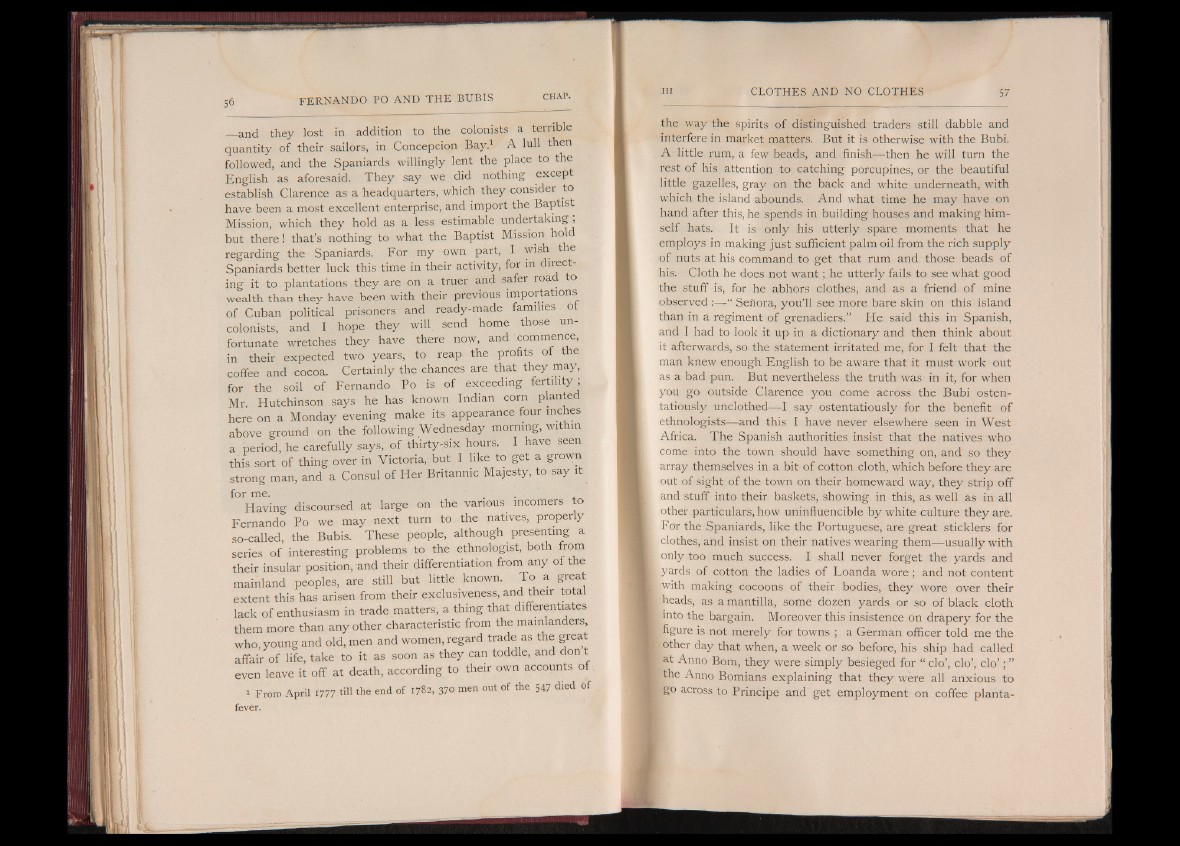
—and they lost in addition to the colonists a terrible
quantity of their sailors, in Concepcion Bay.1 A lull then
followed, and the Spaniards willingly lent the place to the
English as aforesaid. They say we did nothing except
establish Clarence as a headquarters, which they consider to
have been a most excellent enterprise, and import the Baptist
Mission, which they hold as a less estimable undertaking,
but there! that’s nothing to what the Baptist Mission hold
regarding the Spaniards. For my own part, I wish t e
Spaniards better luck this time in their activity, for in directing
it to plantations they are on a truer and safer road to
wealth than they have been with their previous importations
of Cuban political prisoners and ready-made families oi
colonists, and I hope they will, send home those unfortunate
wretches they have there now, and commence,
in their expected two years, to reap the profits of the
coffee and cocoa. Certainly the chances are that they may,
for the soil of Fernando Po is of exceeding fertility;
Mr. Hutchinson says he has known Indian corn planted
here on a Monday evening make its appearance four inches
above ground on the following Wednesday morning, within
a period, he carefully says, of thirty-six hours. I have seen
this sort of thing over in Victoria, but I like to get a grown
strong man, and a Consul of Her Britannic Majesty, to say it
for me. .
Having discoursed at large on the various incomers to
Fernando Po we may next turn to the natives, properly
so-called, the Bubis. These people, although presenting a
series of interesting problems to the ethnologist, both from
their insular position, and their differentiation from any of the
mainland peoples, are still but little known. To a great
extent this has arisen from their exclusiveness, and their total
lack of enthusiasm in trade matters, a thing that differentiates
them more than any other characteristic from the mamlanders,
who, young and old, men and women, regard trade as the great
affair of life, take to it as soon as they can toddle, and don t
even leave it off at death, according to their own accounts of
i From April 1777 till the end of 1782, 370 men out of the 547 died of
fever.
the way the spirits of distinguished traders still dabble and
interfere in market matters. But it is otherwise with the Bubi.
A little rum, a few beads, and finish— then he will turn the
rest of his attention to catching porcupines, or the beautiful
little gazelles, gray on the back and white underneath, with
which the island abounds. And what time he may have on
hand after this, he spends in building houses and making himself
hats. It is only his utterly spare moments that he
employs in making just sufficient palm oil from the rich supply
of nuts at his command to get that rum and those beads of
his. Cloth he does not want; he utterly fails to see what good
the stuff is, for he abhors clothes, and as a friend of mine
observed :— Señora, you’ll see more bare skin on this island
than in a regiment of grenadiers.” He said this in Spanish,
and I had to look it up in a dictionary and then think about
it afterwards, so the statement irritated me, for I felt that the
man knew enough English to be aware that it must work out
as a bad pun. But nevertheless the truth was in it, for when
you go outside Clarence you come across the Bubi ostentatiously
unclothed— I say ostentatiously for the benefit of
ethnologists— and this I have never elsewhere seen in West
Africa. The Spanish authorities insist that the natives who
come into the town should have something on, and so they
array themselves in a bit of cotton cloth, which before they are
out of sight of the town on their homeward way, they strip off
and stuff into their baskets, showing in this, as well as in all
other particulars, how uninfluencible by white culture they are.
Fo'r the Spaniards, like the Portuguese, are great sticklers for
clothes, and insist on their natives wearing them— usually with
only too much success. I shall never forget the yards and
yards of cotton the ladies of Loanda wore; and not content
with making cocoons of their bodies, they wore over their
heads, as a mantilla, some dozen yards or so of black cloth
into the bargain. Moreover this insistence on drapery for the
t figure is not merely for towns ; a German officer told me the
other day that when, a week or so before, his ship had called
at Anno Bom, they were simply besieged for “ clo’, clo’, clo’ ; ”
phe Anno Bomians explaining that they were all anxious to
’ If® acr°ss to Principe and get employment on coffee planta